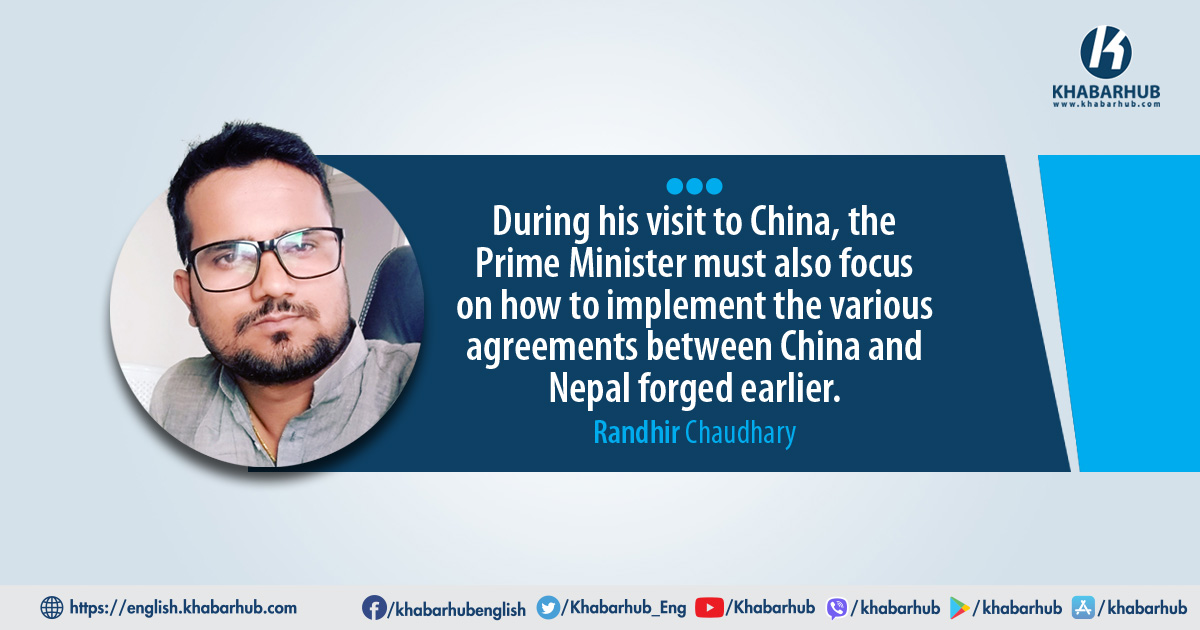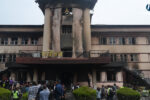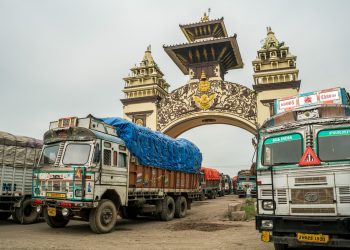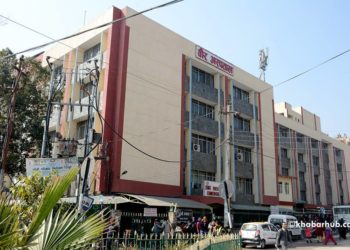The rapid signing of a written agreement for a ruling coalition by the UML and the Nepali Congress, two major political parties with opposing ideologies, caused a stir in Nepali political circles.
The ruling alliance, which initially appeared to be incompatible, has tried to convince the people that it will resolve all of the nation’s issues, including constitutional amendments.
However, there is no concrete evidence of this. For a country like Nepal, which is economically dependent and has low national productivity, geopolitics inevitably affects internal politics.
Furthermore, Nepal is particularly significant in South Asia because of its strategic geographical location.
Prime Minister KP Oli’s trip to China, reportedly planned for December, has drawn significant attention, three months after the formation of the UML-Congress coalition government.
To prepare for Prime Minister KP Sharma Oli’s planned visit, a team headed by the foreign minister will travel to China.
The Nepali Congress has adamantly opposed the idea of Nepal taking on any BRI loans. However, it seems that Congress leaders, who were forced to ally with Oli for power, are gradually adapting to Oli’s approach.
Following the political upheavals of 1990, the prime minister of Nepal began making his first formal international tour to India, a practice that has since become common.
The Nepali prime minister’s official visits, particularly those to China and India, are seen as highly significant.
This has developed into a binary dynamic. In practice, there has been no particular objection from other countries to the Prime Minister’s first visit being to India.
KP Oli, who was elected prime minister for the fourth time, was expected to make his first official visit to India.
In fact, when he traveled to the US for the United Nations General Assembly (UNGA), he managed to hold sideline talks with Indian Prime Minister Narendra Modi after diplomatic efforts by the Nepali side.
KP Oli even invited Modi to visit Nepal. Thus, the circumstances for Oli’s trip to China, after waiting for an invitation from India, are evidently in place.
Some argue that a prime minister of a sovereign country can choose any country for their first visit.
However, Oli himself was keen on making his first official trip to India. The true reasons behind India’s delay in extending an official invitation to Oli may eventually come to light.
In this context, this article aims to emphasize the need for Nepal to exercise caution and to highlight the hidden Chinese interests behind Oli’s impending visit to China.
China’s primary goal in Nepal is to enforce its Belt and Road Initiative (BRI) at all costs.
China’s grandiose BRI program has been a major point of discussion between the two countries for the past seven years.
However, does the BRI maintain the same proportionality on both sides? Does the political scene in Nepal share the same view of the BRI?
Under Pushpa Kamal Dahal’s premiership, Nepal signed the Memorandum of Understanding to join the Belt and Road Initiative in 2017.
As prime minister, KP Sharma Oli presented his Chinese counterpart with 35 BRI projects in 2018.
However, due to Chinese priorities, this number was reduced, and Nepal ultimately agreed to only nine projects.
The BRI was covered in Nepali media in June 2022, five years after it was signed, and subsequently entered public discussion.
Furthermore, it started raising doubts about China’s true intentions in Nepal when it was claimed that the BRI covered a number of projects, such as the Kathmandu Ring Road and Pokhara Airport.
Comparatively, China’s debt trap funding, which it established to further its strategic objectives through investments in developing nations, has proven to be harmful—almost like Pandora’s box.
In fact, the only document that both parties have not yet signed is the one concerning the implementation of the BRI in Nepal. Referring to the BRI as a “leftist project” in Nepal would not be an exaggeration.
The Maoist-UML and other leftist political parties view China as the source of their ideology.
Members of the Nepali Congress have even raised concerns about the lack of transparency in the BRI within the House.
In addition to being wary of Chinese loans, Nepali society has expressed concerns that Nepal should not fall victim to the Chinese debt trap.
However, no instances have been reported where leftist parties or officials have publicly criticized the BRI.
In reality, China has historically been viewed as a capitalist nation with a communist government, and parties like the UML and the Maoists in Nepal are inevitably drawn into ‘crony capitalism.’
The Chinese had no interest in Nepali democracy or republicanism until the country’s monarchy was fully abolished. Democracy in Nepal has been promoted with support from democratic nations other than China.
During his previous term, KP Oli was so trustful of China that, before taking the oath of office as prime minister in 2018, he flew to Rasuwagadhi on the Chinese border and stood at the Miteri Bridge, declaring that the proposed Kerung-Kathmandu railway line was the country’s top priority.
However, China has not made significant progress on these projects, despite having made numerous other agreements, especially concerning railroads.
China aims to keep the communists in power in Nepal indefinitely. China was also displeased with KP Oli when he split from the UML-Maoist alliance.
But when India did not invite Oli to visit as prime minister, it became apparent that China is trying to capitalize on Oli’s “helplessness.”
The question arises whether India weakened Oli by not inviting him first. In terms of parliamentary support, he is not necessarily weak, but a perception has emerged that “this government will not last long.”
It is evident that Prime Minister Oli himself has had to assure the public, saying, “This government will not fall.”
Taking advantage of Oli’s frustration, China is also seeking Nepal’s consent for the implementation of the BRI.
Oli and his party leaders, known for their reactionary politics and diplomacy, may enter into an unnecessary agreement.
If the Nepalese government successfully persuaded China to convert the debt for Pokhara International Airport into a grant, this visit could be seen as a success.
It is clear that the Chinese and Nepali communist leaders have kept the BRI agreement shrouded in secrecy.
The Nepali Congress has adamantly opposed the idea of Nepal taking on any BRI loans. However, it seems that Congress leaders, who were forced to ally with Oli for power, are gradually adapting to Oli’s approach.
It is crucial for everyone to understand that the agreements between Nepal and China are so vague that their interpretations vary from country to country, whether it is Gagan Thapa, who was appointed by Sher Bahadur Deuba to work on the BRI, or other Congress leaders cultivated by the Chinese ambassador.
For example, surprisingly, army generals—not politicians—signed a deal for more than Rs 1.43 billion in military aid during a Chinese general’s visit.
Under the KP Oli administration, China maintained its “communist cooperation” and “strategic partnership” with Nepal in 2018, as evidenced by President Xi Jinping’s visit.
China uses the term “strategic” to further its long-term goals, while Nepal seems to regard it as a means to achieve “economic development.”
Finally, before signing the implementation agreement, Nepali officials have an obligation to educate the Nepali people about China’s strategic aims behind the BRI.
During his visit to China, the Prime Minister must also focus on how to implement the various agreements between China and Nepal forged earlier.
If the Nepalese government successfully persuaded China to convert the debt for Pokhara International Airport into a grant, this visit could be seen as a success.
(Randhir Chaudhary is associated with Peace Development Research Center)









Comment